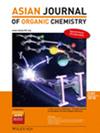三唑基咪唑盐作为抗转移性乳腺癌整合素连接激酶(ILK)抑制剂的设计和合成
IF 2.7
4区 化学
Q1 CHEMISTRY, ORGANIC
引用次数: 0
摘要
乳腺癌转移仍然是一个关键的挑战,需要靶向治疗,破坏肿瘤进展中的关键信号通路。整合素连接激酶(Integrin-linked kinase, ILK)是通过AKT/NF-κB轴调控细胞粘附、迁移和存活的关键调控因子,是抗转移药物开发的一个有希望的靶点。本研究报道了c2取代和未取代咪唑-三唑衍生物作为ILK调节剂的合成和评价。采用Cu(I)催化叠氮化物-炔环加成法合成了化合物,并用FTIR、NMR和质谱对化合物进行了表征。为了探索上游分子间的相互作用,我们利用CXCR4受体(PDB ID: 3ODU)进行对接研究,该受体在转移过程中与ILK激活有功能关联。化合物14表现出较高的结合亲和力(-9.3 kcal/mol),可与Trp94、Asp97和Ile204相互作用,并在100 ns分子动力学模拟中保持稳定。体外对MCF-7细胞的细胞毒性实验中,化合物6的IC50值为170.58±0.3µg/mL,化合物14的IC50值为200.84±0.7µg/mL。构效关系分析(SAR)显示芳香基团和疏水性基团增强了药效。这些结果表明咪唑-三唑复合物是CXCR4-ILK-AKT /NF-κB轴的有希望的调节剂,并且具有进一步发展作为乳腺癌治疗的抗转移药物的潜力。本文章由计算机程序翻译,如有差异,请以英文原文为准。

Design and Synthesis of Triazole‐Based Imidazolium Salts as Potent Integrin‐Linked Kinase (ILK) Inhibitors for Anti‐Metastatic Breast Cancer Therapy
Breast cancer metastasis remains a critical challenge, necessitating targeted therapies that disrupt key signaling pathways in tumor progression. Integrin‐linked kinase (ILK), a key regulator of cell adhesion, migration, and survival via the AKT/NF‐κB axis, is a promising target for anti‐metastatic drug development. This study reports the synthesis and evaluation of C2‐substituted and unsubstituted imidazolium–triazole derivatives as potential ILK modulators. Compounds were synthesized using Cu(I)‐catalyzed azide–alkyne cycloaddition and characterized by FTIR, NMR, and mass spectrometry. To explore upstream molecular interactions, docking studies were conducted using the CXCR4 receptor (PDB ID: 3ODU), functionally linked to ILK activation in metastasis. Compound 14 demonstrated high binding affinity (–9.3 kcal/mol), interacting with Trp94, Asp97, and Ile204, and maintained stability during 100 ns molecular dynamics simulations. In vitro cytotoxicity against MCF‐7 cells identified Compound 6 as the most potent (IC50 = 170.58 ± 0.3 µg/mL), with Compound 14 also showing notable activity (IC50 = 200.84 ± 0.7 µg/mL). Structure–activity relationship analysis (SAR) revealed that aromatic and hydrophobic groups enhanced efficacy. These results suggest that imidazolium–triazole hybrids are promising modulators of the CXCR4–ILK–AKT/NF‐κB axis and hold potential for further development as anti‐metastatic agents in breast cancer therapy.
求助全文
通过发布文献求助,成功后即可免费获取论文全文。
去求助
来源期刊

Asian Journal of Organic Chemistry
CHEMISTRY, ORGANIC-
CiteScore
4.70
自引率
3.70%
发文量
372
期刊介绍:
Organic chemistry is the fundamental science that stands at the heart of chemistry, biology, and materials science. Research in these areas is vigorous and truly international, with three major regions making almost equal contributions: America, Europe and Asia. Asia now has its own top international organic chemistry journal—the Asian Journal of Organic Chemistry (AsianJOC)
The AsianJOC is designed to be a top-ranked international research journal and publishes primary research as well as critical secondary information from authors across the world. The journal covers organic chemistry in its entirety. Authors and readers come from academia, the chemical industry, and government laboratories.
 求助内容:
求助内容: 应助结果提醒方式:
应助结果提醒方式:


